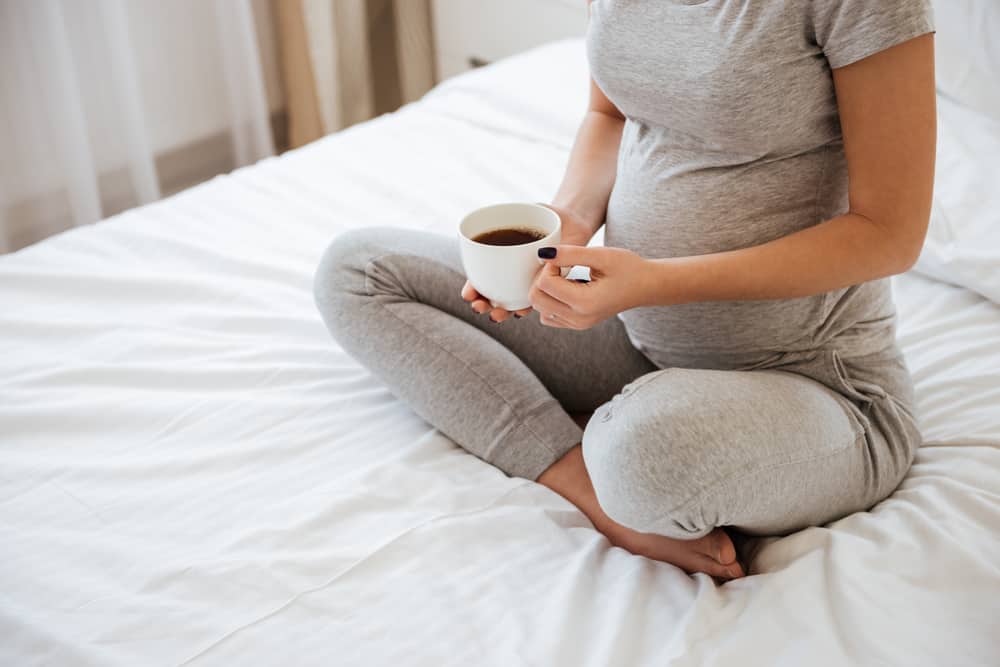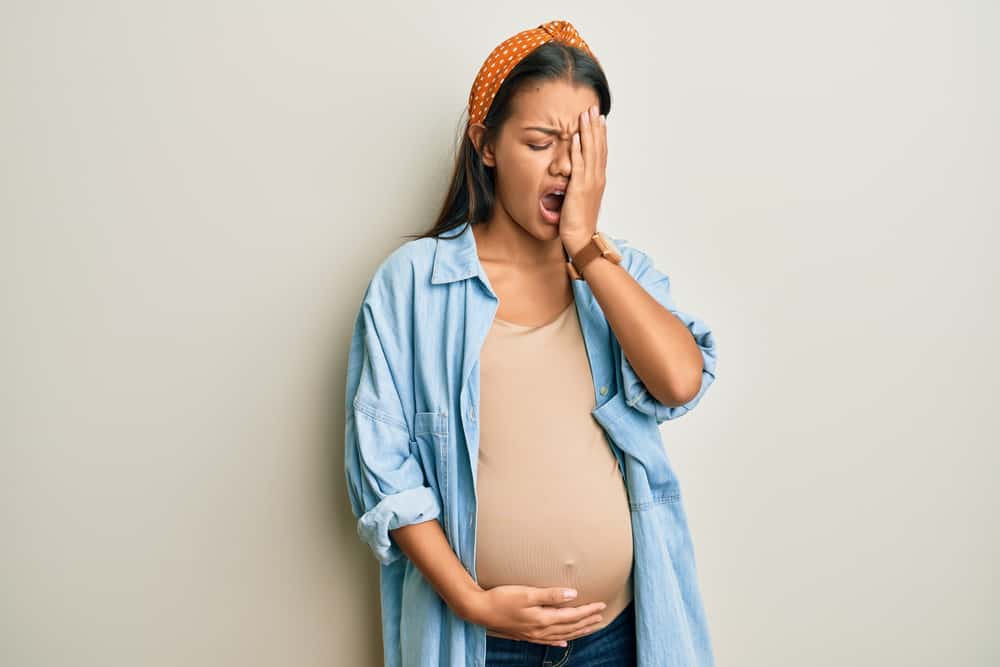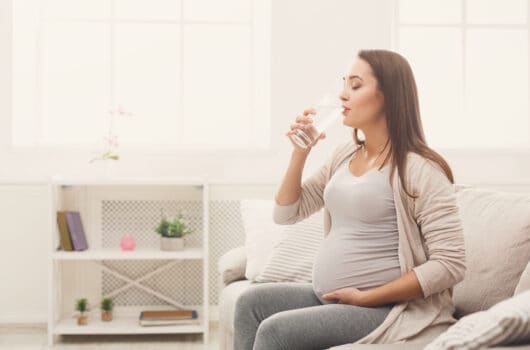Water is important. Up to 60% of the human body is made up of just plain ol’ water.
If you’re young, you need water. If you’re old, you need water. If you’re an unborn baby, you need water. And since pregnant people are drinking water both for themselves and their unborn child, they need to drink lots of it.
Generally speaking, a non-pregnant woman should ingest around 2.2 liters (74 oz) of water per day, but some of this can come from food (rather than just drinks).
When you’re pregnant, you need to drink a little more water than you’re probably used to. You also need to pay attention to how much water you’re drinking, so that you and your baby are getting enough.
- How Much Water Should a Pregnant Woman Drink?
- Why Do I Need so Much Water When I’m Pregnant?
- Can I Drink Coffee When I’m Pregnant?
- What Other Things Can I Drink When I’m Pregnant? Can I Drink Tap Water When I’m Pregnant?
- When I’m Pregnant, Should I Eat Foods With a High Water Content?
- How Much Water Do Babies Need?
- How Do I Know if I’m Not Drinking Enough Water During Pregnancy?
- Tips for Pregnant Women Who Want to Drink More Water
How Much Water Should a Pregnant Woman Drink?
If you’re an average-sized pregnant woman, you should drink around 2.4 liters (80oz) of water per day. If you’re smaller than average, drink less; if you’re larger than average, drink more.
Just like when you’re not pregnant, you should also make adjustments based on your activity and environment. If you’ve been exercising, drink more. If it’s hot, drink more.
You should drink a little more water as your pregnancy progresses. As you become more pregnant, you baby becomes bigger. And when your baby becomes bigger, both you and your unborn child need more water. So try to drink up to 3 liters (104 oz) during your third trimester.
But before following the above advice, always speak to a medical expert. Speak to a doctor, nurse or OB-GYN, who will be able to give specific, bespoke water-drinking recommendations according to your age, health, weight, history, medical conditions and even where you live.
Why Do I Need so Much Water When I’m Pregnant?
As we’ve covered, an adult human is generally made up of around 60% water. But babies, when they’re born, are about 78% water. Because of that, they need lots of it while they’re growing in your womb.
Babies need water for their physical and mental development. When you’re pregnant, your body uses water to produce extra blood along with lots of amniotic fluid.
Water also allows your body to absorb essential nutrients, and transport all the stuff your baby needs. Last of all, water allows your body to quickly and efficiently remove waste from your body (and your baby’s body).
Water is great for you and your baby, and it reduces the chances of pregnancy-related illnesses and ailments including hemorrhoids, constipation, urinary tract infections and kidney infections.
Another common side effect of pregnancy is overheating, which is pretty understandable given you have a brand-new human living and growing inside of you. Drinking lots of water combats this overheating.
Can I Drink Coffee When I’m Pregnant?

Yes, you can drink coffee while you’re pregnant, but if you’re a regular coffee drinker, you’ll probably need to cut down.
Some caffeine is okay, but too much will get into your baby’s bloodstream – and since your baby’s body is unable to properly deal with that caffeine, it’s not great for them. Lots of caffeine, according to some research, is even linked to miscarriages.
If you’re pregnant, try not to drink more than 200mg of caffeine per day, which generally equates to an average-strength 12 oz (350ml) cup of coffee (though that obviously depends on how the coffee is made, the type of beans used, and where you get it from). Here’s a great general guide on how much caffeine you can expect to find in coffee and other drinks.
Remember that caffeine is found in coffee, tea, soda, energy drinks and even chocolate.
If you want to skip caffeine but not coffee (or tea), just drink decaf versions. They’re much better for you and your baby and they usually taste (almost) as good.
You should also try to avoid drinks with too much sugar or artificial sweeteners. This includes soda and most flavored waters.
What Other Things Can I Drink When I’m Pregnant? Can I Drink Tap Water When I’m Pregnant?
Drinking tap water during pregnancy is typically fine, but that’s not always the case depending on where you live and how well-filtered your water is. Generally, if you would drink your tap water when you aren’t pregnant, you can probably also drink it when pregnant. But you should speak to a local doctor, nurse or OB-GYN just to be 100% sure.
But you don’t have to drink only water. You can drink lots of other stuff too:
- Seltzer Water: seltzer water and carbonated water are a little more exciting than still water, and they’re both absolutely safe to drink. The bubbles can even help with nausea, which can be mega helpful while you’re pregnant.
- Herbal Teas: herbal teas are pretty much always caffeine-free, and they’re always full of good stuff.
- Natural Flavorings: if you’re tired of plain old water, add some natural flavorful stuff. Good choices are lemon, lime, cucumber, mint and fruits.
- Smoothies: these are an excellent choice, and offer lots of hydration along with plenty of vitamins and minerals. Try not to drink too many smoothies, as they have a lot of sugar, but if the worst thing you’re consuming is a smoothie, you’re doing okay.
- Milk: milk is made up of more than 80% water, it’s packed with good stuff and it provides lots of protein for you and your baby, who are both trying to grow. Try to drink organic, free-range milk if you can, which has less artificial hormones.
When I’m Pregnant, Should I Eat Foods With a High Water Content?
It’s important to drink lots of water when you’re pregnant, but it’s also important to eat foods which contain lots of water too. These foods will add extra water to your diet, and they’re usually very healthy (which is obviously good for both you and your baby).
If you’re eating and drinking well, you’ll be staying hydrated and healthy, and filling yourself and your baby with lots of excellent vitamins and minerals.
How Much Water Do Babies Need?
After babies are born, hydration (of course) continues to be massively important. But babies shouldn’t drink water until they’re around 6 months old, or sometimes even a little older.
This means that babies get all of their water from milk.
If you’re breastfeeding, you therefore need to drink even more water, to make sure both you and your baby are staying hydrated during the entire breastfeeding period. During this period, women should generally aim to drink around 3 liters (104 oz) of water per day.
How Do I Know if I’m Not Drinking Enough Water During Pregnancy?

If you follow the guidelines above, you’ll very likely be drinking enough water. But if you have any signs of dehydration, you should try to drink more. Here are some common signs and symptoms of dehydration:
- Tiredness. Yeah, you’ll be tired anyway, but if this tiredness is accompanied by dizziness, headaches and a noticeable lack of energy, there’s a good chance that it’s caused by dehydration.
- Thirst and hunger: the first one is pretty obvious, but lots of hunger is actually just disguised thirst.
- Confusion: if you get brain fog or if you feel like your thoughts are slow and muddied, try drinking more water. Often, pregnancy can cause confusion in moms-to-be, but drinking water is a good solution.
- Pee color: if your pee is straw-colored or transparent, that means your body is getting lots of water. If it’s dark, you definitely need to drink more.
Tips for Pregnant Women Who Want to Drink More Water
Struggling to drink enough water? If you’re looking for some helpful water-drinking hacks, here are our favorites:
- Sip sip sip: try to sip throughout the day, rather than chugging down liters when and where you can. If you sip regularly, you and your baby are staying properly hydrated. Carrying a bottle everywhere you go can help.
- Eat good food: again, eat lots of fruits and veggies, as they’re brimming with water. Even soups contain lots of water, but try to go for low-sodium options.
- Keep things varied: as mentioned above, you don’t have to drink just As long as you’re not drinking lots of caffeine, alcohol or heavily-sweetened stuff, you can drink lots of other things.
- Start the day with a glass: it’s important to hydrate as soon as you wake up. And if you start the day with a big glass of water, you’re more likely to get into the habit of drinking water frequently and routinely.
